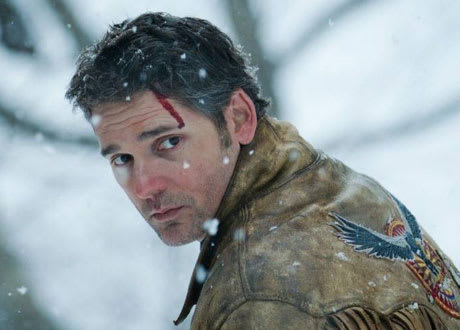Set in a snowy landscape on the American Thanksgiving weekend, Austrian director Stefan Ruzowitzky's English-language debut, Deadfall, is a contemplative and deliberate work of defeatist fatalism, having as much to do with frozen, dead winter stillness as it does the central plot, wherein a Casino, presumably native, given the locale, is robbed on Thanksgiving
There's also a feeling and sensibility throughout that suggests a traditional Western in reverse, where a modern generation cowboy bookends a legacy built almost entirely upon violence and subjugation.
This cowboy is Addison (Eric Bana), a functioning psychopath on the run with his sister, Liza (Olivia Wilde), after the aforementioned heist. Separating from her after a car accident on an icy road leaves them in danger of arrest ― and after their situation is exacerbated by the murder of a well-intentioned deputy ― he treks through the snow, surviving via various acts of violence that either serve himself and defy reason or fit into his distorted moral lexicon, where he fancies himself a saviour of women and children from men with similarly violent dispositions.
Liza survives by hooking up with Jay (Charlie Hunnam), an ex-convict with a similar outlook as Addison, whose tendency to rush into every decision, without the complex reasoning demonstrated by the many female characters in the film leads to his immediate trust of this mysterious stranger. And this inevitably puts his parents (Sissy Spacek and Kris Kristofferson) in danger.
It's no accident that Deadfall takes place on Thanksgiving weekend, reaching its climax during a dinner built entirely upon potential violence. It's also not an accident that every female character, including perpetually repressed and humiliated police officer Hanna (Kate Mara), is subject to condescension and blind male protection, despite having a far more elaborate and guarded approach to the world around them.
All of the men jump to violence and aggression, both from cyclic, learned behaviour and a lack of rational discernment, causing problems and conflict, more often for themselves than anyone else. It's as though everyone is predetermined to act out self-imposed doom, which is a tone that Ruzowitzky captures perfectly with his many shots of an empty, snow-laden landscape and overall sombre haze fuelling every moment not driven by an irrational act of aggression or misguided self-preservation.
He's pointing out that America, built upon kneejerk violence for selfish reasons (more often rationalized as survivalist) is in itself trapped in the cycle of inevitability, trudging forward with a rigid male sensibility not because it has to, but because it doesn't know anything else.
In such, this subdued work of beauty can be forgiven the occasional contrivance and overt metaphor. Even the atonal, awkward performance from Charlie Hunnam isn't enough to derail the stark, sad and ultimately fatal dynamic and trajectory Ruzowitzky creates.
(eOne)There's also a feeling and sensibility throughout that suggests a traditional Western in reverse, where a modern generation cowboy bookends a legacy built almost entirely upon violence and subjugation.
This cowboy is Addison (Eric Bana), a functioning psychopath on the run with his sister, Liza (Olivia Wilde), after the aforementioned heist. Separating from her after a car accident on an icy road leaves them in danger of arrest ― and after their situation is exacerbated by the murder of a well-intentioned deputy ― he treks through the snow, surviving via various acts of violence that either serve himself and defy reason or fit into his distorted moral lexicon, where he fancies himself a saviour of women and children from men with similarly violent dispositions.
Liza survives by hooking up with Jay (Charlie Hunnam), an ex-convict with a similar outlook as Addison, whose tendency to rush into every decision, without the complex reasoning demonstrated by the many female characters in the film leads to his immediate trust of this mysterious stranger. And this inevitably puts his parents (Sissy Spacek and Kris Kristofferson) in danger.
It's no accident that Deadfall takes place on Thanksgiving weekend, reaching its climax during a dinner built entirely upon potential violence. It's also not an accident that every female character, including perpetually repressed and humiliated police officer Hanna (Kate Mara), is subject to condescension and blind male protection, despite having a far more elaborate and guarded approach to the world around them.
All of the men jump to violence and aggression, both from cyclic, learned behaviour and a lack of rational discernment, causing problems and conflict, more often for themselves than anyone else. It's as though everyone is predetermined to act out self-imposed doom, which is a tone that Ruzowitzky captures perfectly with his many shots of an empty, snow-laden landscape and overall sombre haze fuelling every moment not driven by an irrational act of aggression or misguided self-preservation.
He's pointing out that America, built upon kneejerk violence for selfish reasons (more often rationalized as survivalist) is in itself trapped in the cycle of inevitability, trudging forward with a rigid male sensibility not because it has to, but because it doesn't know anything else.
In such, this subdued work of beauty can be forgiven the occasional contrivance and overt metaphor. Even the atonal, awkward performance from Charlie Hunnam isn't enough to derail the stark, sad and ultimately fatal dynamic and trajectory Ruzowitzky creates.
